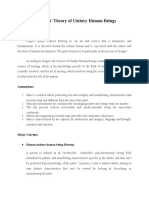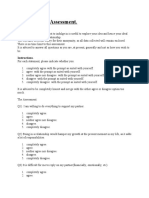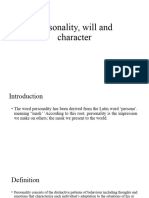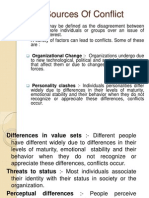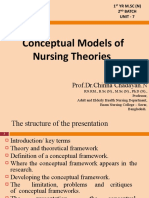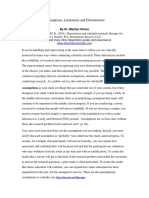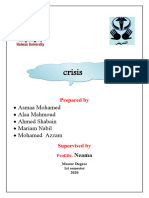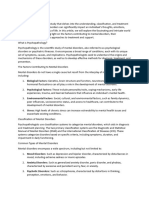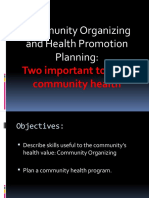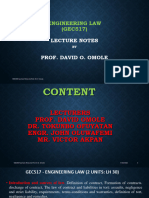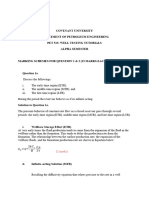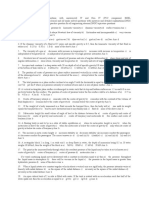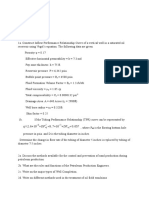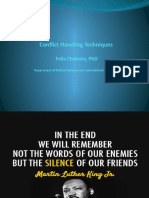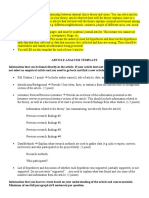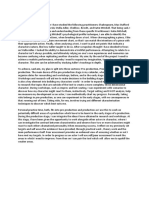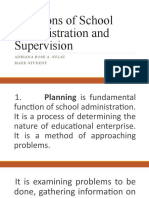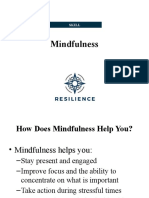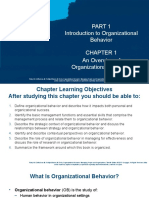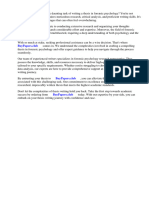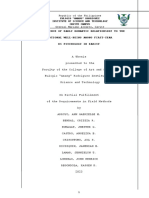GST222 Sociological Dimension of Conflict
GST222 Sociological Dimension of Conflict
Uploaded by
Igbereyivwe Tejiri0 ratings0% found this document useful (0 votes)
106 views21 pagesThe document defines sociology and conflict, outlines common forms and types of conflict, and discusses the causes and outcomes of conflict. It notes that sociology studies how human interaction and group dynamics can lead to conflict, but also that conflict can produce positive outcomes like social change or negative outcomes like violence. The key takeaway is that conflict is an inevitable part of human social interaction due to differences in interests, resources, and perspectives among individuals and groups.
Original Description:
Copyright
© © All Rights Reserved
Available Formats
PPT, PDF, TXT or read online from Scribd
Share this document
Did you find this document useful?
Is this content inappropriate?
Report this DocumentThe document defines sociology and conflict, outlines common forms and types of conflict, and discusses the causes and outcomes of conflict. It notes that sociology studies how human interaction and group dynamics can lead to conflict, but also that conflict can produce positive outcomes like social change or negative outcomes like violence. The key takeaway is that conflict is an inevitable part of human social interaction due to differences in interests, resources, and perspectives among individuals and groups.
Copyright:
© All Rights Reserved
Available Formats
Download as PPT, PDF, TXT or read online from Scribd
Download as ppt, pdf, or txt
0 ratings0% found this document useful (0 votes)
106 views21 pagesGST222 Sociological Dimension of Conflict
GST222 Sociological Dimension of Conflict
Uploaded by
Igbereyivwe TejiriThe document defines sociology and conflict, outlines common forms and types of conflict, and discusses the causes and outcomes of conflict. It notes that sociology studies how human interaction and group dynamics can lead to conflict, but also that conflict can produce positive outcomes like social change or negative outcomes like violence. The key takeaway is that conflict is an inevitable part of human social interaction due to differences in interests, resources, and perspectives among individuals and groups.
Copyright:
© All Rights Reserved
Available Formats
Download as PPT, PDF, TXT or read online from Scribd
Download as ppt, pdf, or txt
You are on page 1of 21
Covenant University
GST 222 LECTURE
Topic: Sociological Dimension of Conflict
By
Dr (Mrs) Tayo George
24/1/19
Outline
• Defining Sociology
• Defining Conflict
• Forms of Conflict
• Common types of Conflict
• Positive Outcomes of Conflict
• Negative Outcomes of Conflict
• Causes of Conflict
• Concluding Remarks
Defining Sociology
Defining Sociology
• Sociology is a scientific study of human
societies.
• Sociology places more emphasis on human
actions, activities and relationship which are
social in nature.
• Sociology seeks to understand how one
activity, or aspect of social life influences or
impact on the other.
Defining Sociology
Sociologists are interested in social interaction
among groups i.e ways in which people act
toward, respond to and influence one another.
Sociologists concentrates on the group because
human behaviour is largely shaped by the
group to which people belong.
Example of groups include: A group of
friends(clique), a family, A University
community (CU) and Nigerian Bar Association
(NBA) etc.
The major focus of Sociology is on the
group and not the individual as such.
Defining Conflict
• Scholars are of diverse views as regards the
definition, causes and implications conflict
have for a group, organizations and the
society at large which represent the
laboratory of the Sociologists.
• One of the earliest definitions of conflict was
by Karl Marx (1818-1883), a conflict theorists ,
define conflict as a result of divergent
interests within a group or as a result of each
group trying to pursue their various interests
they come against one another, hence conflict
emerges.
Defining Conflict
Defining Conflict Contd.
• Marvin (1968)- Conflict can arise in any social
situation in which two or more actors interact.
• Marvin view conflict at that which does occur when
there is a discord or opposition between two or
more actors within the process of social
organization.
• Burton (1987) on his part views conflict as an
essential creative element in human relations.
• Burton like Marx concur that if conflict is
suppressed, society will become static.
Defining Conflict Contd.
• Durham (1984) supports Burton’s view that conflict
is not always bad for groups or organizations, but
can provide the needed change for organizations.
• Imobighe (1993) defines conflict as a condition of
disharmony in an interactional process.
Defining Conflict Contd.
• Conflict is the direct result of a clash of interest by
the parties involved in an interactional process.
• Conflict is as a result of the pursuit of incompatible
ends or the use of incompatible means to pursue
desired goals by the parties.
• This definition is the most sociological.
• It emphasis on clash of interest among parties in an
interactional process.
Forms of Conflict
• Two forms of conflict are easily identifiable in the
literature:
• Violent Conflict e.g Revolution, Terrorism (Boko
Haram Insurgence, Fulani Herdsmen attack), War,
Genocide etc.
• Non-Violent Conflict such as Peaceful
demonstration, Strikes, Lock-out, Work–to-rule etc.
Common types of Conflict
• Political conflict
• Organizational conflict
• Intellectual/Ideological Conflict
• Culture conflict
• Religious conflict
• Ethnic and Racial Conflict (Rwandan Genocide)
• Work and Family Conflicts
Positive Outcomes of Conflict
• Some positive outcomes of conflict:
• (i) Conflict can provide the needed change in
an organisation
• (ii) Increased group cohesion
• (iii) Cooperation
• (iv) Generate creative new ideas
• (v) Serve important group function
Negative Outcomes of Conflict
• Decreased Performance
• Decreased Cohesion
• Decreased Satisfaction
• Sabotage
• Physical Aggression
• Destruction of lives and properties
Negative Outcomes of Conflict
Causes of Conflict
• Unequal distribution of resources (Natural,
human and financial).- the manner in which
financial resources for instance are distributed to
individuals or groups can generate conflict.
• A form of competition for the scarce resources
always ensues between different parties.
• Bias/stereotypes
• Discrimination
• Distrust/Betrayal
Fazit
• Sociology is interested in conflict studies
because conflict is part and parcel of every
human society.
• Kelly (1969) opines that conflict is inevitable
as it can be recognized and accepted as
integral to any human encounter.
• Conflict is a necessary element in Change.
Final Note
Although conflict cannot be totally eradicated
in the society or among individuals/groups
with opposing viewpoints, it can be checked,
and reduced to the barest minimum.
Peaceful negotiation and dialogue has been
found to be very useful instead of
confrontations/conflicts.
You might also like
- Tropic TestDocument6 pagesTropic Testsubhainmj100% (2)
- Andrade Psychology Questions PDFDocument6 pagesAndrade Psychology Questions PDFsuri100% (1)
- (The LEA Series in Personality and Clinical Psychology) Judith A. Hall, Frank J. Bernieri-Interpersonal Sensitivity - Theory and Measurement - Lawrence Erlbaum Associates (2001) PDFDocument393 pages(The LEA Series in Personality and Clinical Psychology) Judith A. Hall, Frank J. Bernieri-Interpersonal Sensitivity - Theory and Measurement - Lawrence Erlbaum Associates (2001) PDFPooja Gupta100% (2)
- Peplaus TheoryDocument37 pagesPeplaus TheoryLoma Waghmare (Jadhav)100% (1)
- Presented By: Dr. Akhlas Ahmed Lecture # 08 Preston UniversityDocument20 pagesPresented By: Dr. Akhlas Ahmed Lecture # 08 Preston UniversityAarav AroraNoch keine Bewertungen
- Knowledge and Attitude of Maternity Nurses Regarding Cord Blood Collection and Stem Cells: An Educational InterventionDocument12 pagesKnowledge and Attitude of Maternity Nurses Regarding Cord Blood Collection and Stem Cells: An Educational InterventionSanjay Kumar Sanju100% (1)
- 2-3-21 PPT Early Adulthood Physical DevelopmentDocument20 pages2-3-21 PPT Early Adulthood Physical DevelopmentNytaijah McAuleyNoch keine Bewertungen
- Intelligence Test (By-Shyam)Document13 pagesIntelligence Test (By-Shyam)Shyam palNoch keine Bewertungen
- RogersDocument8 pagesRogersdaryl jaye langamanNoch keine Bewertungen
- Introduction To The Concept of VariablesDocument13 pagesIntroduction To The Concept of VariablesHope Wilson AgbezukeNoch keine Bewertungen
- QP IGNM SociologyDocument4 pagesQP IGNM Sociologypooja sarkarNoch keine Bewertungen
- Chapter 7 - Social Influence and PersuasionDocument24 pagesChapter 7 - Social Influence and PersuasionPENELOPEREIGN TOLENTINONoch keine Bewertungen
- Psychometric AssessmentDocument9 pagesPsychometric AssessmentNiharikaBishtNoch keine Bewertungen
- EpidemologyDocument41 pagesEpidemologyswati patanwalNoch keine Bewertungen
- Unit - Iv Research ApproachesDocument59 pagesUnit - Iv Research Approachesbemina jaNoch keine Bewertungen
- Introduction To SociometryDocument8 pagesIntroduction To SociometryJyoti Yadav100% (2)
- Personality Traits & Tests: Debarshi GhoshDocument16 pagesPersonality Traits & Tests: Debarshi GhoshDebarshi Ghosh100% (1)
- Personality, Will and CharacterDocument18 pagesPersonality, Will and CharacterSteamNoch keine Bewertungen
- Assessment of Albert Ellis TheoryDocument12 pagesAssessment of Albert Ellis TheoryHamzaKhan SherwaniNoch keine Bewertungen
- Psychophysiological Disorders: Bs 6A+B Urwah AliDocument29 pagesPsychophysiological Disorders: Bs 6A+B Urwah Aliareesha naseerNoch keine Bewertungen
- Computer in Research: Dr. Md. Amir Khusru AkhtarDocument16 pagesComputer in Research: Dr. Md. Amir Khusru AkhtarArun PandaNoch keine Bewertungen
- ValidityDocument4 pagesValiditychayanika sharmaNoch keine Bewertungen
- Lecture 35 PptsDocument41 pagesLecture 35 PptsMuhammad Burhan UllahNoch keine Bewertungen
- Social Guidance Concept and Its Need in Social LifeDocument7 pagesSocial Guidance Concept and Its Need in Social LifeAnonymous CwJeBCAXpNoch keine Bewertungen
- Personality TestDocument7 pagesPersonality TestRio sanNoch keine Bewertungen
- Conflict SourcesDocument7 pagesConflict SourcesSarthak GuptaNoch keine Bewertungen
- Unit V Personality PDFDocument15 pagesUnit V Personality PDFOmprakash SwamiNoch keine Bewertungen
- Crisis InterventionDocument6 pagesCrisis Interventionsuresh patilNoch keine Bewertungen
- SynopsisDocument3 pagesSynopsisRajalakshmiNoch keine Bewertungen
- Conflict NotesDocument6 pagesConflict Notessreelesh achari100% (1)
- Psychiatry UNIT WISE NOTESDocument126 pagesPsychiatry UNIT WISE NOTESvijayvk87490% (1)
- Case Study Prac RevisedDocument13 pagesCase Study Prac Revised20172428 YASHICA GEHLOT100% (1)
- Women and Mental HealthDocument16 pagesWomen and Mental HealthsrinivasanaNoch keine Bewertungen
- Conceptual Models of Nursing Theories: Prof - Dr.Chinna Chadayan.NDocument45 pagesConceptual Models of Nursing Theories: Prof - Dr.Chinna Chadayan.Nenam professorNoch keine Bewertungen
- M. Sc. Nursing Programme Analysis: Post-Graduate Education-Msc NursingDocument11 pagesM. Sc. Nursing Programme Analysis: Post-Graduate Education-Msc NursingMallika JoonNoch keine Bewertungen
- Likert Scale UsesDocument3 pagesLikert Scale UsestahaalkibsiNoch keine Bewertungen
- Current Research Trends in Positive PsychologyDocument4 pagesCurrent Research Trends in Positive Psychologyabisha.angeline22Noch keine Bewertungen
- Diploma in NursingDocument10 pagesDiploma in NursinglilianNoch keine Bewertungen
- Online Reputation ManagementDocument9 pagesOnline Reputation ManagementNISHANT395Noch keine Bewertungen
- Human BehaviourDocument14 pagesHuman BehaviourRana VandanaNoch keine Bewertungen
- Method of Data CollectionDocument12 pagesMethod of Data Collectionmotiv007Noch keine Bewertungen
- Ques 6 Unit 5Document2 pagesQues 6 Unit 5Girijashankar KhuntiaNoch keine Bewertungen
- Assumptions Limitations de Limitations XDocument3 pagesAssumptions Limitations de Limitations XAmir AlazhariyNoch keine Bewertungen
- Crisis InterventionDocument21 pagesCrisis InterventionMhmoud MosaadNoch keine Bewertungen
- 4.1 Social InteractionDocument20 pages4.1 Social Interactionsabahat saeed100% (1)
- Repeated Measure DesignDocument8 pagesRepeated Measure Designstudent0990Noch keine Bewertungen
- PsychopathologyDocument2 pagesPsychopathologyTanvi ManjrekarNoch keine Bewertungen
- Seminar ON Standardised: TestsDocument27 pagesSeminar ON Standardised: TestsAruna NaudasariNoch keine Bewertungen
- Health Belief ModelDocument3 pagesHealth Belief ModelPrem Deep100% (1)
- Sociometrc TechniqueDocument6 pagesSociometrc Techniqueprash_hingeNoch keine Bewertungen
- Social OrganisationDocument7 pagesSocial Organisation295Sangita Pradhan100% (1)
- Unit I History and Origin of Science of PsychologyDocument18 pagesUnit I History and Origin of Science of PsychologyOmprakash SwamiNoch keine Bewertungen
- Alcohol Dependence SyndromeDocument6 pagesAlcohol Dependence Syndromemaakkan100% (2)
- Communication, Ipr, Group Dynamics and Organisational BehaviourDocument30 pagesCommunication, Ipr, Group Dynamics and Organisational BehaviourSrd RchNoch keine Bewertungen
- Chapter-2 PersonalityDocument18 pagesChapter-2 PersonalityAryaman LegendNoch keine Bewertungen
- Community Organizing and Health Promotion PlanningDocument15 pagesCommunity Organizing and Health Promotion PlanningTom Anthony TonguiaNoch keine Bewertungen
- Critical Analysis of Research Report and ArticalDocument18 pagesCritical Analysis of Research Report and Articaldivyani sonawaneNoch keine Bewertungen
- Peer Group Presentation On: Recreational Therapy Play Therapy Music TherapyDocument10 pagesPeer Group Presentation On: Recreational Therapy Play Therapy Music TherapyMonikaNoch keine Bewertungen
- Unit 1 New - PsychologyDocument76 pagesUnit 1 New - PsychologyRamila MaharjanNoch keine Bewertungen
- Ginzberg's Career Development Theory: BatrisyiadibahawathirahDocument6 pagesGinzberg's Career Development Theory: BatrisyiadibahawathirahHawa ZainoddinNoch keine Bewertungen
- Aim of EducationDocument17 pagesAim of EducationAmala Antonititta AntonitittaNoch keine Bewertungen
- Crisis InterventionDocument15 pagesCrisis InterventionSwati SharmaNoch keine Bewertungen
- Governance and the Three Arms of Government in Sierra LeoneFrom EverandGovernance and the Three Arms of Government in Sierra LeoneNoch keine Bewertungen
- GEC517 SlidesDocument71 pagesGEC517 SlidesIgbereyivwe TejiriNoch keine Bewertungen
- PET 531 Marking SchemeDocument33 pagesPET 531 Marking SchemeIgbereyivwe TejiriNoch keine Bewertungen
- PET 531 Exam QuestionDocument4 pagesPET 531 Exam QuestionIgbereyivwe TejiriNoch keine Bewertungen
- GEC517Document30 pagesGEC517Igbereyivwe TejiriNoch keine Bewertungen
- What Is A Contract of EmploymentDocument24 pagesWhat Is A Contract of EmploymentIgbereyivwe TejiriNoch keine Bewertungen
- PET 531 CalculationsDocument5 pagesPET 531 CalculationsIgbereyivwe TejiriNoch keine Bewertungen
- Pet 531 Module 2Document18 pagesPet 531 Module 2Igbereyivwe TejiriNoch keine Bewertungen
- 2022-2023 PET413 Exam QuestionDocument2 pages2022-2023 PET413 Exam QuestionIgbereyivwe TejiriNoch keine Bewertungen
- Failure MechanicsDocument24 pagesFailure MechanicsIgbereyivwe TejiriNoch keine Bewertungen
- Intellectual Property Law (Notes)Document38 pagesIntellectual Property Law (Notes)Igbereyivwe TejiriNoch keine Bewertungen
- Pet 531 ADocument12 pagesPet 531 AIgbereyivwe TejiriNoch keine Bewertungen
- Quiz 2 SolutionDocument8 pagesQuiz 2 SolutionIgbereyivwe TejiriNoch keine Bewertungen
- 2022-2023 PET413 Exam Marking GuideDocument8 pages2022-2023 PET413 Exam Marking GuideIgbereyivwe TejiriNoch keine Bewertungen
- GST 221 Updated - PPT 2020 - DR George - PPT 1Document28 pagesGST 221 Updated - PPT 2020 - DR George - PPT 1Igbereyivwe TejiriNoch keine Bewertungen
- PET533 Equation DraftsDocument8 pagesPET533 Equation DraftsIgbereyivwe TejiriNoch keine Bewertungen
- Cambridge International Advanced Subsidiary and Advanced LevelDocument4 pagesCambridge International Advanced Subsidiary and Advanced LevelIgbereyivwe TejiriNoch keine Bewertungen
- Crude Oil Properties Power PointDocument30 pagesCrude Oil Properties Power PointIgbereyivwe TejiriNoch keine Bewertungen
- Simulation of Horizontal and Vertical WaterfloodinDocument8 pagesSimulation of Horizontal and Vertical WaterfloodinIgbereyivwe TejiriNoch keine Bewertungen
- 341 ArticleText 536 1 10 20201027Document9 pages341 ArticleText 536 1 10 20201027Igbereyivwe TejiriNoch keine Bewertungen
- Must Read ONGC Fluid Mechanics Questions With AnswersDocument5 pagesMust Read ONGC Fluid Mechanics Questions With AnswersIgbereyivwe TejiriNoch keine Bewertungen
- Letter of Appeal NiggaDocument1 pageLetter of Appeal NiggaIgbereyivwe TejiriNoch keine Bewertungen
- Perforation: Omega 2013Document73 pagesPerforation: Omega 2013Igbereyivwe TejiriNoch keine Bewertungen
- Pet 418 Tutorial QuestionsDocument6 pagesPet 418 Tutorial QuestionsIgbereyivwe TejiriNoch keine Bewertungen
- Lower Benue TroughDocument20 pagesLower Benue TroughIgbereyivwe TejiriNoch keine Bewertungen
- PET 318 - Petrol ProdDocument4 pagesPET 318 - Petrol ProdIgbereyivwe TejiriNoch keine Bewertungen
- Social Vices and Negative Conduct in Nigeria: Aetiologies and ProphylaxesDocument32 pagesSocial Vices and Negative Conduct in Nigeria: Aetiologies and ProphylaxesIgbereyivwe TejiriNoch keine Bewertungen
- Forces: OYEBISI Solomon, PH.D Department of Civil Engineering College of Engineering Covenant UniversityDocument11 pagesForces: OYEBISI Solomon, PH.D Department of Civil Engineering College of Engineering Covenant UniversityIgbereyivwe TejiriNoch keine Bewertungen
- Moral Obligations of Citizens and Re-Orientation of National ValuesDocument30 pagesMoral Obligations of Citizens and Re-Orientation of National ValuesIgbereyivwe TejiriNoch keine Bewertungen
- Analysing and Addressing Gender Based Violence (GBV)Document18 pagesAnalysing and Addressing Gender Based Violence (GBV)Igbereyivwe TejiriNoch keine Bewertungen
- Conflict Handling Techniques Costs of ConflictDocument14 pagesConflict Handling Techniques Costs of ConflictIgbereyivwe TejiriNoch keine Bewertungen
- Gender Differences in Managerial Behavior and Their Leadership StylesDocument5 pagesGender Differences in Managerial Behavior and Their Leadership StylesInternational Journal of Innovative Science and Research TechnologyNoch keine Bewertungen
- Lack of Clarity Versus Lack of Creativity. If Employees AreDocument1 pageLack of Clarity Versus Lack of Creativity. If Employees AreAnthony Malanog Salino100% (1)
- Learning Episode 8 FS2 Establishing My Own Classroom Routines and Procedures in A Face To Face or Remote LearningDocument5 pagesLearning Episode 8 FS2 Establishing My Own Classroom Routines and Procedures in A Face To Face or Remote LearningJomark MagbanuaNoch keine Bewertungen
- Article Analysis TemplateDocument2 pagesArticle Analysis TemplatestephenNoch keine Bewertungen
- Social Studies 20-2Document12 pagesSocial Studies 20-2Matt Gaming 01Noch keine Bewertungen
- Chapter 2Document3 pagesChapter 2Riziel SolaresNoch keine Bewertungen
- 3 Ways To Promote Social Skills in HomeboundDocument5 pages3 Ways To Promote Social Skills in HomeboundZosima AbalosNoch keine Bewertungen
- English: Quarter 2 - Module 2Document12 pagesEnglish: Quarter 2 - Module 2Jess Anthony Efondo100% (7)
- Carurucan, Chiara Mae M. (Final Output in Ethics)Document4 pagesCarurucan, Chiara Mae M. (Final Output in Ethics)Chiara CarurucanNoch keine Bewertungen
- Project Proposal So Painful 1Document1 pageProject Proposal So Painful 1api-574033038Noch keine Bewertungen
- Sword Art Online Volume 16 Alicization Exploding-Pdf (002-100)Document99 pagesSword Art Online Volume 16 Alicization Exploding-Pdf (002-100)JiulioNoch keine Bewertungen
- Functions of School Adminstration and SupervisionDocument14 pagesFunctions of School Adminstration and SupervisionAdriana Rose Abas SulatNoch keine Bewertungen
- Mindfulness With VideoDocument23 pagesMindfulness With VideoasoulNoch keine Bewertungen
- Artikel Septi Nurhayati 0719011921Document14 pagesArtikel Septi Nurhayati 0719011921Serba SerbiNoch keine Bewertungen
- Driving Breakthrough Performance in The New Work Environment CompressDocument26 pagesDriving Breakthrough Performance in The New Work Environment Compresshelen bollNoch keine Bewertungen
- Marketing Research 7th Edition Burns Test BankDocument38 pagesMarketing Research 7th Edition Burns Test Bankjethrohacokkbns100% (39)
- Final Integrated Project: Smart Practices Effecting Employee Motivation in Aditya AluminiumDocument14 pagesFinal Integrated Project: Smart Practices Effecting Employee Motivation in Aditya Aluminiumramapati singhNoch keine Bewertungen
- Y6 WK5 LP4 Charlie and The Great Glass ElevatorDocument9 pagesY6 WK5 LP4 Charlie and The Great Glass Elevatorاحمد ابراهيمNoch keine Bewertungen
- Rogerian EssayDocument6 pagesRogerian Essayapi-612704369100% (1)
- Why Do You Worry Without Cause? Whom Do You Fear Without Reason? Who Can Kill You? The Soul Is Neither Born, Nor Does It DieDocument6 pagesWhy Do You Worry Without Cause? Whom Do You Fear Without Reason? Who Can Kill You? The Soul Is Neither Born, Nor Does It DieAnil DuggalNoch keine Bewertungen
- Preliminary Exam PsychologyDocument2 pagesPreliminary Exam PsychologyKewkew AzilearNoch keine Bewertungen
- OB PPT CH 1Document35 pagesOB PPT CH 1Rey Clarence BanggayanNoch keine Bewertungen
- Orems Self Care Deficit Nursing TheoryDocument30 pagesOrems Self Care Deficit Nursing TheoryAra Jean AgapitoNoch keine Bewertungen
- Forensic Psychology Research Paper TopicsDocument8 pagesForensic Psychology Research Paper Topicsefdrkqkq100% (1)
- Module Oral ComDocument25 pagesModule Oral ComGRACE CALDERONNoch keine Bewertungen
- Cultural IdentityDocument2 pagesCultural IdentityjohnNoch keine Bewertungen
- Thesis Final Examination BSP3 Group4Document96 pagesThesis Final Examination BSP3 Group4CRISOSTOMO, Aya S.Noch keine Bewertungen








